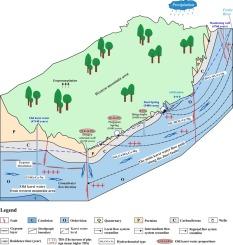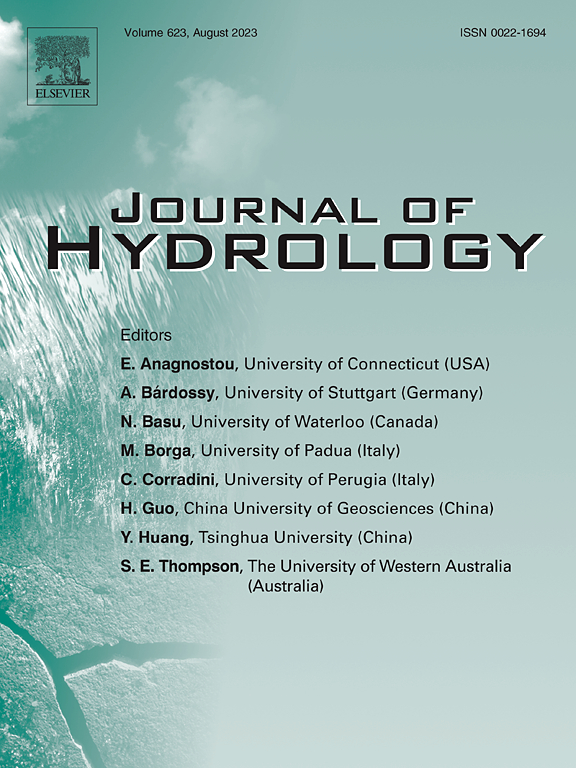结合水动力学、地球化学和多同位素示踪剂了解中国北方晋祠岩溶地下水系统的水文地质功能
IF 5.9
1区 地球科学
Q1 ENGINEERING, CIVIL
引用次数: 0
摘要
岩溶地下水对全球可持续供水和生态发展非常重要。然而,由于缺乏对岩溶系统水文地质功能的了解,增加了岩溶水资源管理的挑战。在此,通过连续监测排放速率,控制晋祠岩溶水系主要排放点(如晋祠泉、平泉等)的自然响应。通过采集水样,利用地球化学和同位素示踪剂对晋祠岩溶水系地下水的化学演化过程进行约束。趋势分析测试(Mann-Kendall)的应用表明,晋祠岩溶水系高度依赖于天然补给,并受到人类活动的影响。我们的研究首先及时揭示了来自滞洪区的老岩溶地下水可能是岩溶含水层的主要补给源之一。我们对老岩溶水的补给比例和化学效应进行了评估。老岩溶水的补给比例沿晋祠泉至东峪自流井的主要流路逐渐增加,估计最高混合比达 24.8%。据观察,老岩溶水的混合补给导致晋祠泉南部地区岩溶水的总溶解固体(TDS)、硫酸盐(SO42-)和硫同位素(δ34S-SO4)值显著升高,可能威胁饮用水的质量和安全。我们的研究为地下水循环提供了新的视角,也为岩溶地区的地下水管理提出了新的挑战。本文章由计算机程序翻译,如有差异,请以英文原文为准。

Combining hydrodynamics, geochemical and multiple isotopic tracers to understand the hydrogeological functioning of karst groundwater system in Jinci, northern China
Karst groundwater is important for global sustainable water supply and ecological development. However, the lack of understanding of karst systems’ hydrogeological functioning increases the challenges of karst water resources management. Here, the natural responses of the main discharge sites (such as Jinci Spring, Pingquan Spring and so on) of Jinci karst water system were controlled by continuous monitoring of the discharge rate. Water samples were collected to constrain the chemical evolution of groundwater in Jinci karst water system through geochemical and isotopic tracers. The application of trend analysis tests (Mann-Kendall) shows the Jinci karst water system is highly dependent on natural recharge and influenced by human activities. Our research first timely revealed that old karst groundwater from the stagnation areas might potentially be one of the main recharge sources of karst aquifers. The recharge proportions and chemical effects of the old karst water were evaluated. The recharge proportions of old karst water increased gradually along the main flow path from the Jinci Spring to the Dongyu artesian well, where the highest estimated mixing ratio was up to 24.8 %. It was observed that the mixing recharge of the old karst water causes a significant elevation of total dissolved solids (TDS), sulfate (SO42-), and sulfur isotope (δ34S-SO4) values in karst water from the southern area of Jinci Spring, which may threaten the quality and safety of drinking water supply. Our research provides a new view on groundwater circulation and poses new challenges for groundwater management in the karst areas.
求助全文
通过发布文献求助,成功后即可免费获取论文全文。
去求助
来源期刊

Journal of Hydrology
地学-地球科学综合
CiteScore
11.00
自引率
12.50%
发文量
1309
审稿时长
7.5 months
期刊介绍:
The Journal of Hydrology publishes original research papers and comprehensive reviews in all the subfields of the hydrological sciences including water based management and policy issues that impact on economics and society. These comprise, but are not limited to the physical, chemical, biogeochemical, stochastic and systems aspects of surface and groundwater hydrology, hydrometeorology and hydrogeology. Relevant topics incorporating the insights and methodologies of disciplines such as climatology, water resource systems, hydraulics, agrohydrology, geomorphology, soil science, instrumentation and remote sensing, civil and environmental engineering are included. Social science perspectives on hydrological problems such as resource and ecological economics, environmental sociology, psychology and behavioural science, management and policy analysis are also invited. Multi-and interdisciplinary analyses of hydrological problems are within scope. The science published in the Journal of Hydrology is relevant to catchment scales rather than exclusively to a local scale or site.
 求助内容:
求助内容: 应助结果提醒方式:
应助结果提醒方式:


